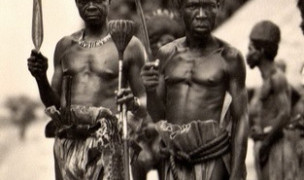 4 Terms
4 TermsHome > Terms > English (EN) > gangs
gangs
Despite a long history of immigrant successes, accusations of gang formation often challenge new groups in American society. These stereotypes emphasize different lifestyles or opportunities, but may also control community organization or justify exclusion because of culture, race, class or generation. These charges have denigrated African Americans, Irish Americans, Chinese Americans and Cuban Americans in turn. Meanwhile, the specter of clandestine organized crime—whether tongs among Chinese, or the Mafia among Italians—has justified police surveillance, mass media sensationalism, missionary reform and policies ranging from vague urban renewal to gated community withdrawal.
Those defined by such negative views have been more diverse. Criminal behavior emerges from many social forces, including realistic socialization in urban life. In many cases, however, the neighborhood or ethnic group smeared by the acts of a few has been deeply divided by these same actions. This is evident in African American community campaigns against contemporary black-on-black violence. Gang accusations, moreover, often show groups embodying fundamental American beliefs. Virtue, for example, is defined in loyalty to groups and localities, although gangs have promoted strong individualism as well. Gangs also gender crime—they have been strongly associated with males, while females, although likely to belong to associations, are depicted as isolated criminals or fallen women. Finally gangs have come to symbolize negative traits of urban disorder versus rural tranquility or the safety of the small town and the protected suburb.
The twentieth-century history of gangs has been more complex. In the 1920s and 1930s, as urban wars winnowed crime families, new youth gangs continued to spring up in changing environments. The transformations of American society after the Second World War, however, changed the ideological landscape of crime and fear. As suburban havens welcomed the middle class, the city could be perceived as a “realm of hoodlums”. Nonetheless, hot rodders (with anti-social “traits”) turned hallmarks of suburbia—cars and nurtured teenagers—into problems evident in Marlon Brando’s The Wild One (1954).
Study and policy υis-à-υis gangs also have been shaped by politics and representation.
Hence, in the 1960s, researchers sought integrative solutions as their authors detailed portraits of young men in gang nations such as Vice Lords of Chicago, IL or the streetcorner networks of New York City and Washington, DC. Blacks, and later, Hispanics, figured prominently among depictions of urban problems: Leonard Bernstein’s West Side Story (1961) recast Romeo and Juliet as a conflict between Puerto Rican and “American” teenage gangs. Nonetheless, some gangs were incorporated into urban renovation and neighborhood/racial pride.
As urban residents demanded equality however, new questions surfaced. Riots, shifting family patterns and urban decay in the 1960s emphasized the social problems facing new generations. By the 1970s, statistics on gangs and organized opposition increased.
Meanwhile, drug trafficking and new weaponry which linked organized crime and local gangs, heightened urban violence. As consumerist values in the media bombarded those with less access to resources, drugs and crime proved tempting, despite consequences.
When new immigrants formed associations to facilitate assimilation, they were also tainted by reference to gangs. Thus, established Chinese American communities complain about the violent incursions of Fukienese and Southeast Asians.
The 1980s and 1990s witnessed new extensions of crime and association. Women have increasingly public roles in all levels. In 1992 riots in Los Angeles, CA, the notorious gang nations of the city Crips and Bloods, emerged as potential peacemakers, which the Los Angeles Police Department could not be. Meanwhile, news and policy-makers continue to focus on drugs, corruption and drive-by violence.
Mass media have long contributed to a sense of gangs as a pervasive urban problem.
Gangsters have been a movie staple from James Cagney in Public Enemy (1931) to modern depictions such as The Godfather Trilogy (1972; 1974; 1990), New Jack City (1991) and Pulp Fiction (1994), as well as documentaries like A. Mishan’s Bui Doi (1994).
Quite apart from the real and violent nature of many other aspects of American society crime, gangs and other associations around illegal activities have multiple meanings and interpretations, encompassing assimilation, protest and solidarity as well as mere gain or pleasure. Gangs develop from strength as well as weakness, solidarities and alliances as well as divisions. As such, they entail neither simple problems nor simple solutions.
- Part of Speech: noun
- Synonym(s):
- Blossary:
- Industry/Domain: Culture
- Category: American culture
- Company: Routledge
- Product:
- Acronym-Abbreviation:
Other Languages:
Member comments
Terms in the News
Billy Morgan
Sports; Snowboarding
The British snowboarder Billy Morgan has landed the sport’s first ever 1800 quadruple cork. The rider, who represented Great Britain in the 2014 Winter Olympics in Sochi, was in Livigno, Italy, when he achieved the man-oeuvre. It involves flipping four times, while body also spins with five complete rotations on a sideways or downward-facing axis. The trick ...
Marzieh Afkham
Broadcasting & receiving; News
Marzieh Afkham, who is the country’s first foreign ministry spokeswoman, will head a mission in east Asia, the state news agency reported. It is not clear to which country she will be posted as her appointment has yet to be announced officially. Afkham will only be the second female ambassador Iran has had. Under the last shah’s rule, Mehrangiz Dolatshahi, a ...
Weekly Packet
Language; Online services; Slang; Internet
Weekly Packet or "Paquete Semanal" as it is known in Cuba is a term used by Cubans to describe the information that is gathered from the internet outside of Cuba and saved onto hard drives to be transported into Cuba itself. Weekly Packets are then sold to Cuban's without internet access, allowing them to obtain information just days - and sometimes hours - after it ...
Asian Infrastructure Investment Bank (AIIB)
Banking; Investment banking
The Asian Infrastructure Investment Bank (AIIB) is an international financial institution established to address the need in Asia for infrastructure development. According to the Asian Development Bank, Asia needs $800 billion each year for roads, ports, power plants or other infrastructure projects before 2020. Originally proposed by China in 2013, a signing ...
Spartan
Online services; Internet
Spartan is the codename given to the new Microsoft Windows 10 browser that will replace Microsoft Windows Internet Explorer. The new browser will be built from the ground up and disregard any code from the IE platform. It has a new rendering engine that is built to be compatible with how the web is written today. The name Spartan is named after the ...
Featured Terms
cassowary
Cassowaries are rare flightless birds found on the Rook Islands. They are vicious animals that are territorial by nature, and are often seen in groups ...
Contributor
Featured blossaries
farooq92
0
Terms
47
Blossaries
3
Followers
Top 5 TV series of 2014
 4 Terms
4 Terms
Browers Terms By Category
- Alcohol & Hydroxybenzene & Ether(29)
- Pigments(13)
- Organic acids(4)
- Intermediates(1)
Organic chemicals(47) Terms
- General law(5868)
- Contracts(640)
- Patent & trademark(449)
- Legal(214)
- US law(77)
- European law(75)
Law(7373) Terms
- General Finance(7677)
- Funds(1299)
- Commodity exchange(874)
- Private equity(515)
- Accountancy(421)
- Real estate investment(192)
Financial services(11765) Terms
- Ballroom(285)
- Belly dance(108)
- Cheerleading(101)
- Choreography(79)
- Historical dance(53)
- African-American(50)
Dance(760) Terms
- Printers(127)
- Fax machines(71)
- Copiers(48)
- Office supplies(22)
- Scanners(9)
- Projectors(3)


